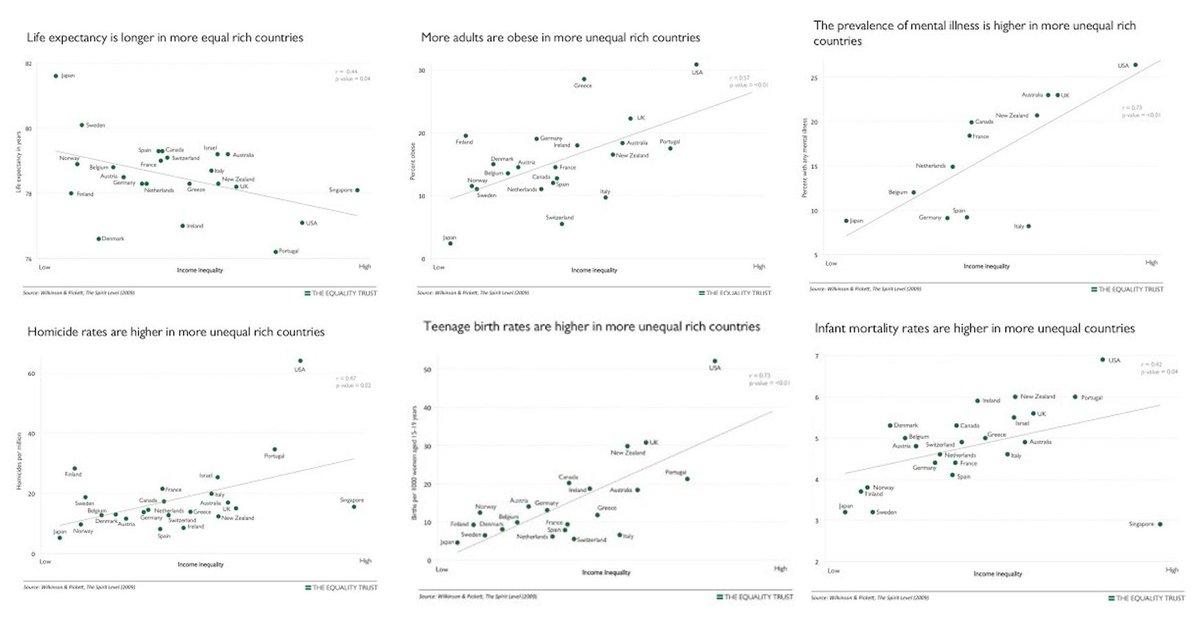
Have you ever heard it said that wealthy countries should prioritise reducing #inequality over growing the economy?
The 2009 book #TheSpiritLevel makes perhaps the most influential argument for that position.
But it is badly flawed.
This thread explains why. 👇
1/9
The 2009 book #TheSpiritLevel makes perhaps the most influential argument for that position.
But it is badly flawed.
This thread explains why. 👇
1/9

#TheSpiritLevel argues that income inequality leads to a range of bad social outcomes concerning life expectancy, obesity, mental health, homicide and child mortality.
They draw on data from 23 of the world's 50 richest countries to show convincing-looking correlations 👇
2/9
They draw on data from 23 of the world's 50 richest countries to show convincing-looking correlations 👇
2/9

But what about the missing 27?
The authors say some lacked data. But excluded countries like Korea and Czechia seem to have it in abundance.
Countries with pop <3m were left out "to avoid tax havens". But countries like Slovenia clearly can't be categorised in this way.
3/9
The authors say some lacked data. But excluded countries like Korea and Czechia seem to have it in abundance.
Countries with pop <3m were left out "to avoid tax havens". But countries like Slovenia clearly can't be categorised in this way.
3/9

Excellent work by @cjsnowdon has shown that when the figures are updated and data for the suspiciously excluded countries is added, the purported statistical relationships all break down.
In fact, some of the trends actually reverse.
See: (bit.ly/3lHIK0p)
4/9
In fact, some of the trends actually reverse.
See: (bit.ly/3lHIK0p)
4/9

Have #TheSpiritLevel’s authors cherry-picked countries to create the impression of a relationship between inequality and negative social and health outcomes that isn’t there?
The same question can be asked of the way the social outcomes themselves were selected... 👇
5/9
The same question can be asked of the way the social outcomes themselves were selected... 👇
5/9
This graph produced by @Saunderspeter shows that it's possible to cherry-pick indicators to tell a different inequality story.
Using a similar technique to #TheSpiritLevel, he plots a reverse trend showing equality leading to worse outcomes.
See: bit.ly/3qw08IT
6/9
Using a similar technique to #TheSpiritLevel, he plots a reverse trend showing equality leading to worse outcomes.
See: bit.ly/3qw08IT
6/9

As we can see, the statistical methods used to support #TheSpiritLevel's arguments do not stand up to scrutiny.
But even if they did, would it be right to accept the authors' conclusions at face value?
7/9
But even if they did, would it be right to accept the authors' conclusions at face value?
7/9
Countries are complex entities with unique populations and histories.
A diverse range of factors can influence their health and social outcomes.
Countries are difficult to compare like for like, and correlations between indicators don’t necessarily imply causation.
8/9
A diverse range of factors can influence their health and social outcomes.
Countries are difficult to compare like for like, and correlations between indicators don’t necessarily imply causation.
8/9

Pure statistical methods are limited in what they can tell us about economic policy.
This is why #Austrians make use of #praxeology when evaluating questions concerning human value judgments.
For more on how these can be applied to inequality see: bit.ly/3lJ0CYw
9/9
This is why #Austrians make use of #praxeology when evaluating questions concerning human value judgments.
For more on how these can be applied to inequality see: bit.ly/3lJ0CYw
9/9
• • •
Missing some Tweet in this thread? You can try to
force a refresh















